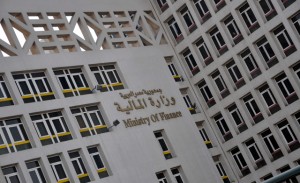
(DNE File Photo)
The Ministry of Finance has issued a statement defining the strategic goals and general guidelines for the Egyptian ministries and governmental bodies that must be followed when setting the new general budget for the fiscal year 2014/2015.
The ministry defined seven strategic goals that the new budget will aim to achieve. First among these, it said, would be a constant consideration for the impact of fiscal policies on achieving social justice.
The ministry added that there should be a clear distinction between economic and social goals. At the same time public policies should be dictated by an agreed upon understanding of desired qualitative and quantitative public policy objectives.
“There is no doubt that one of the most important factors that hinders development is limited public resources,” read the statement.
The ministry added that the development of public resources to guarantee that they meet essential strategic goals will be achieved through the prioritisation of social and economic spending needs.
Concerning strategic goals related to commodities, the ministry said that it “aspires to increase the efficiency of stored commodities and to activate centralised purchasing to protect public funds.”
When defining, “centralised purchasing,” the ministry said that “the descriptions of the resources requested from ministries and governmental entities must be unified and the quality of the products purchased must be considered.” The ministry added that “purchasing should be conducted with an in-depth understanding of the market.”
The ministry stated that public investments should contribute to development and increasing the prosperity of the nation. Such investments should increase “national income” and the Gross Domestic Production (GDP) as well as reduce the rates of unemployment.
“A general budget is essential in reaching the economic and social goals of the nation. The primary goal of the budget is to benefit all Egyptians and take into consideration the state of the low income citizens through a focus on ‘national income’ as well as economic growth.”
The ministry added that “the general budget is an essential policy tool and must reflect the coordination between the fiscal and monetary that will decrease the deficit, control the general debt and reduce the inflation rates.”
The ministry further stated that “transparency and public disclosure,” are also required of the coming budget. The statement explained that “it is no longer appropriate to hide resources and non-recurring expenses from the general budget or the public treasury.”
“Public spending should not be a goal in itself but rather a means to achieve development. For each additional expense an economic or social gain must be achieved.”
The coordination and communication between different governmental bodies and the Ministry of Finance was also emphasised in the statement. The ministry pointed out that setting a systemised general budget was not the end goal, and emphasised the need for proper implementation.”
“The community’s participation has become a necessity which will assist in achieving the nation’s goals. The public is one of the main decentralised pillars available to address the community’s demands,” the ministry concluded.
Egyptian ministries will submit their general budgets on 31 December.



